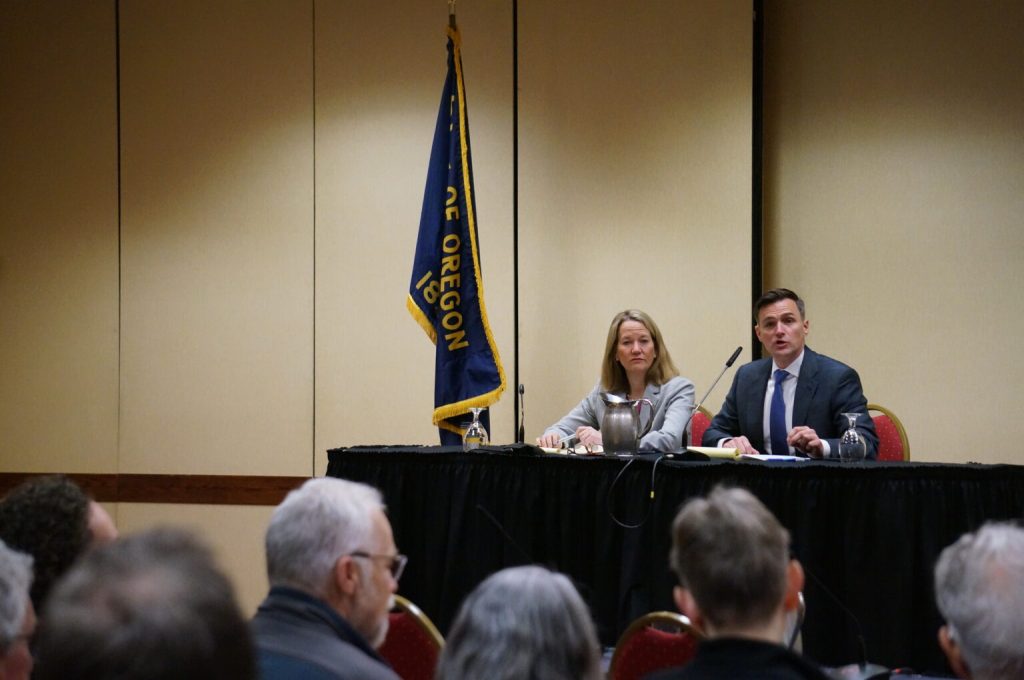In suit against Trump administration tariffs, states argue president exceeded powers
Published 7:04 am Thursday, May 22, 2025

- Oregon Attorney General Dan Rayfield (right) and Arizona Attorney General Kris Mayes (left) hosted a town hall in Portland April 10, 2025. The two states attorneys general are among 23 Democratic attorneys general nationwide who have sued the federal government more than a dozen times in the first three months of Trump’s second term. (Alex Baumhardt/Oregon Capital Chronicle)
Lawyers for Oregon and 11 states attorneys general argued no relationship exists between “extraordinary” threats Trump wants to confront and tariffs he’s imposed
President Donald Trump is misusing a 1977 law and falsely claiming an “unusual and extraordinary threat” to the United States to justify costly tariffs on nearly all imported goods, lawyers representing Oregon and 11 other states told judges on Wednesday.
Brian Simmonds Marshall, a senior assistant attorney general at the Oregon Department of Justice, argued Trump’s tariffs should be stopped to three federal judges at the Court of International Trade in New York City as part of the case State of Oregon et al v. Donald J. Trump et al.
Oregon Attorney General Dan Rayfield and 11 other Democratic attorneys general filed that case — against Trump, the U.S. Department of Homeland Security and its leader, Kristi Noem, and U.S. Customs and Border Patrol and its leader, Peter Flores — on April 23. No decision in the case was made Wednesday. Rayfield at a news conference after the hearing said that judges had fast-tracked the case and are moving quickly.
“We anticipate that they’re going to continue going down that road,” he said.
Lawyers for Trump and the federal agencies insinuated that they would appeal the case to the U.S. Supreme Court if things did not go their way at the international trade court.
Oregon and the other attorneys general — from Arizona, Colorado, Connecticut, Delaware, Illinois, Maine, Minnesota, Nevada, New Mexico, New York and Vermont — are challenging four of Trump’s executive orders since April that have added fluctuating tariffs on most imports from China, Mexico and Canada and a 10% tariff on most all other goods imported from other countries to the U.S.
Trump has said the tariffs will address the threat of fentanyl getting into the country and the U.S.’s trade deficit. The attorneys general have said Congress, not the president, has the sole authority to set tariff policy.
In court on Wednesday, Marshall argued both that Trump is acting outside his authority and that a trade imbalance is not the “unusual and extraordinary threat” Congress envisioned when it passed the International Emergency Economic Powers Act in 1977, which gives the president broad latitude on financial regulation and foreign policy in the event of a national emergency.
“There is no relationship between the problem the administration is trying to confront and the tariffs imposed,” he told the judges. By Trump’s logic, he added, “so long as the president wants to impose a tariff, he can do it for any reason, so long as he says ‘it’s an unusual and extraordinary threat.’”
Declaring an emergency
The judges seemed to agree with Marshall, questioning Brett Shumate, a lawyer from the U.S. Department of Justice, about why both Mexico and Canada have tariffs if nearly all the fentanyl smuggled into the U.S. comes from the Mexico-U.S. border.
The judges referred to U.S. Customs and Protection data that found about 97% of fentanyl was intercepted at the country’s southwest border — mostly carried by American citizens coming through legal ports of entry — and less than 1% was seized at the northern border.
“The president’s executive orders have imposed tariffs equally against both countries. Does that seeming disparity affect our analysis?” one judge asked.
Shumate gave a meandering response.
“What the president explained is that Mexican cartels have come to the northern border into Canada, and that is a threat, the expanding of the fentanyl operation in Canada, and the amount of fentanyl that comes across the northern border every year killing nine-and-a-half million Americans,” Shumate said. “The president didn’t want that problem to spiral out of control and come to the same level of a crisis that we have had at the southern (border).”
Arguments that a trade deficit could equate to a national security emergency are also confounding to the attorneys general, Rayfield told reporters.
“Australia has had a trade deficit for more than 50 years. The United Kingdom has run a trade deficit for 40 years. These are fairly normal in economies that are focused on services, like ours is,” he said.
Shumate argued to the judges that courts do not have the power to decide whether the president is right in declaring an emergency or whether the president’s response to the emergency is correct.
“It’s not the role of the court to second-guess whether the president has chosen the right means or adequately explained himself,” he said.
Under the emergency economic powers act, Shumate said, Trump has broad leeway to address emergencies, with options ranging from investigating to cutting off goods from coming into the country. Rayfield said the argument that the courts have no role to play in checking the power of a president’s use of the emergency economic powers act should “enrage” people.
“If you take them at their word, he could declare an emergency for anything, right? And that would be unreviewable,” Rayfield said.
Judge Jane Restani summed up the argument from Trump’s lawyers as: “Nothing is so crazy or unrelated that it could be stopped by the courts. Anything is allowed. Any declaration of emergency based on some crazy thing, any remedy, as crazy as it could be, it’s all okay because the courts can’t do anything.”








